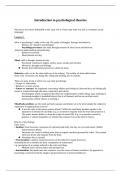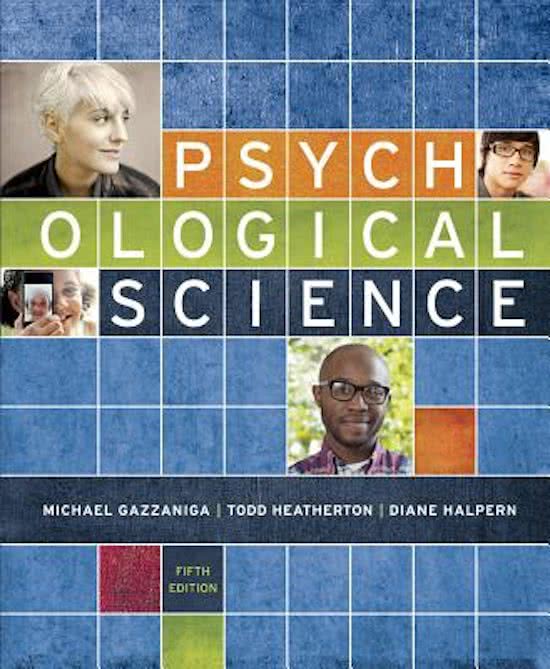Introduction to psychological theories
Wat niet in de lectures behandeld wordt, maar wel in t boek staat komt wss niet in t tentamen (zoals
language)
Lecture 1:
What is psychology?: study of the soul. The study of thoughts, feelings and behavior.
- Humans are ‘intuitive psychologists’
- Psychological science: the study through research of mind, brain and behavior.
Aimed at understanding and predicting;
- Behaviors (actions)
- Mind (mental activity)
Mind: stuff of thought, mental activity.
- Perceptual experiences (sights, smells, tastes, sounds and touches)
- Memories, thoughts and feelings.
Results from biochemical processes within the brain.
Behavior; what we do, the observable tip of the iceberg. The totality of observable human.
Some only in humans, but things like eating and drinking also in animals.
There are many levels at which you can study psychology:
• Groups vs. individuals
• Behavior vs. brain activity
• Nature vs. nurture: the arguments concerning whether psychological characteristics are biologically
innate or acquired through education, experience and culture.
- Psychologists widely recognizes that these are complementary (vullen elkaar aan), resulting in
fascinating insights (a basketball player that is tall (nature) and has an excellent coach
(nurture) has a better chance at winning.)
Mind/body problem: are the mind and body separate and distinct or is the mind simply the subjective
experience of ongoing brain activity?
Is not the same as the nature nurture debate!! While the mind/body problem speaks to the
separation of mental life and body. E.g. is an emotion separate from the brain that produces it.
The nature nurture debate is about the origin of mental life. E.g. is an emotion caused by
genetics or culture (regardless of whether the emotion lives in the mind or brain.)
History of psychology:
Early roots;
• dualism: from Descartes, separation of soul/mind and body, but they are yet intertwined. (1600s)
- Nature/nurture debate.
- Descartes: the body is nothing more than an organic machine governed by reflex. The rational
mind was divine and separate from the body.
Nowadays this is rejected.
• Structuralism: complex mental processes can be reduced to simple processes.
Structuralists try to identify the basic components of contresness?
e.g. perception of an orange reduced to the color and shape.
- Methods used: reaction times and introspection.
• functionalism: the mind came into existence over the course of human evolution. An approach to
psychology concerned with the adaptive purpose/function of mind and behavior.
, - It helps humans adapt to environmental demands and passing along genes to future
generations.
Functionalists look more at ‘why-questions’ (why are we afraid of heights, why do we prefer people
with certain features etc.)
- Mind is more complex than its elements.
Natural selection: features that are adaptive (that facilitate survival and reproduction) are passed
along and those that are not adaptive are not.
First psychologists:
Wilhelm Wundt (1832-1920) prof. of physiology - Structuralist
William James (1842-1910) prof. of philosophy – Functionalist
- A core idea of James is that the mind is more complex than its elements and therefore cannot
be broken down.
- First psychology labs date from 1875/1879 (Leipzig / Harvard)
Evolution: focus on the functions of behavior. The ways our behavior helps us to survive and
reproduce.
• genetic diversity: mutation = variation
- Benefits of sexual reproduction
• environmental pressures
- Evolution has no foresight.
Sexual selection: traits that aid in reproduction (e.g. bird songs and ‘dance’, peacock’s tail)
Psychology is about behavior and the brain, how does evolution come into play?
- Can provide answers to the ‘why questions’
Schools of thought:
• psychoanalytical approach
• behaviorism
• gestalt
• Humanistic psychology
• cognitivism
I. Psychoanalytical approach: mental processes operate below the level of conscious
awareness.
- Unconscious drives.
- Freud, psychoanalyst.
- Influential outside of psychology. (popular culture, literature)
II. Behaviorism: a psychological approach that emphasizes (benadrukt) environmental
influences on observable behaviors.
Only observable behavior can be subject of scientific investigation.
Studying observable behavior to the exclusion of mental events such as thoughts and feelings.
- Building on work of Pavlov.
‘psychology’s focus should be on how environment affects observable behavior. (Watson & skinner)
III. Gestalt: a few basic principles guide visual perception
These explain how visual input is grouped into a coherent whole
- ‘the whole is bigger than the sum of its parts’
IV. Humanistic psychology: an approach focusing on basic goodness in people, achieving
goals and finding fulfilment.
- Positive psychology
, - Values, creativity, quality of relationships, gratitude, faith.
V. Cognitivism: cognitive revolution
- Exploring mental process, influences by the progress in computer science.
Cognitive neuroscience: we can infer how the mind works by looking at behavior.
- Neuroimaging has even made the mind observable.
Studying the soul:
The scientific method;
Based on the experience, observation, existing theories etc. come up with a question and a prediction
test that prediction against real measurement from the physical world make conclusions with
regard to your questions, show support or lack of for your prediction.
Some biases we will encounter:
Confirmation bias: people overweigh evidence that supports their beliefs and tend to
downplay evidence that doesn’t match what they believe.
Seeing causal relationships that don’t exist: misperception that two events that happen at
the same time must somehow be related. comes from our desire to find predictability in the
world.
Accepting after-the-fact explanations/hindsight bias: people are wonderful at explaining
why things happened in the past, but we are much less successful at predicting future events.
Optimism bias: we tend to think we are better than others.
People should be skeptical of other people’s descriptions of their personal strengths, because people
often lack the expertise to accurately evaluate and compare their abilities.
The importance of the scientific method:
Our intuitions and even perceptions can be biased.
- Scientific method can help to overcome these problems.
Critical thinking and psychology: how to consume psychological science?
critical thinking: systematically questioning and evaluating information using well-supported
evidence. (Carefully weighing the facts when deciding what to believe.)
- With amiable skepticism: combines openness and wariness
(behoedzaamheid/voorzichtigheid). Remains open to new ideas but is wary of new scientific
findings when good evidence and sounds reasoning do not seem to support them.
- Critical thinking evaluates provocative research questions. It involves looking for holes in
evidence, using logic and reasoning to see whether the information makes sense and
considering alternative explanations.
Contemporary psychology:
What is new in psychology?;
• biology (evolution)
• big data, computational modeling (computers can solve mathematical models that describe the
motion of the planets and the invisible properties of thought.) big data: Science that uses very large
data sets and advanced computational methods to discover patterns that would be difficult to detect
with smaller data sets.
• culture: The beliefs, values, rules, norms, and customs that exist within a group of people who share
a common language and environment.
• interdisciplinary influences (crossing levels of analysis)
Summary:
- Psychological science is the study of mind, brain and behavior
- Our common sense is often wrong/biased
- Scientific Method and evidence are required!
, - Psychological sciences teaches critical thinking
- Psychology’s schools of thought reflect different perspectives on mind, brain and behavior
with roots in structuralism and functionalism
- Psychological science increasingly incorporates insights from biology and culture
Lecture 2:
Superstitious behavior/superstition: Belief that is not based on human reasoning or scientific
knowledge, but mostly on fear and the supernatural we believe that A leads to B. E.g. when you see a
black cat you will have bad luck.
- Sometimes randomly/by accident some kind of consequence might lead to the desired effect
and confirm your belief and then you keep on doing that.
Learning: a relatively enduring change in
behavior that results from experience.
- Environment is never constant,
individuals must adapt to ever-changing
conditions of the specific environments
they live in.
- You don’t only learn from books and
school, but you learn from experiences
and environment. (This can also have a
downside, e.g. when you grow up in a
unsafe environment you learn other things)
The study of learning examines how we adjust our behavior based on the repetition of stimuli or on
predictive associations between the stimuli, actions or consequences.
Unlearning: with the changing environment we don’t need some associations anymore. If we all
would keep all the associations we wouldn’t have the capacity to learn new things. so it is also
really important for us to forget some things if we don’t longer need it.
- Same for conditioning, if we don’t longer need it we forget things we were conditioned to
before.
I. Non-associative learning: occurs after repeated exposure to a single stimulus or event.
You learn to adjust responses. Imagine a stimulus that triggers behavior (airplane noise
annoys you)
Repeated exposure to this stimulus can either: decrease behavior: habituation: you get used
to it (and adapt) or increase behavior; sensitization: you get even more annoyed. (or e.g. you
shouldn’t get habituated to an alarm)
So:
- habituation: when our behavioral response to a stimulus decreases. If something is neither
rewarding nor harmful, this leads us to ignoring it. (not like sensory adaption, because you still
perceive the stimuli.)
- dishabituation: the increase in a response because of a change in something familiar. E.g. you
only notice the sirens if they suddenly stop.
- Sensitization: when our behavioral response to a stimulus increases after being exposed to a
stimulus. E.g. when you study and smell smoke you will not habituate, but you focus more on
your sense of smell to assess the possible threat of fire.






